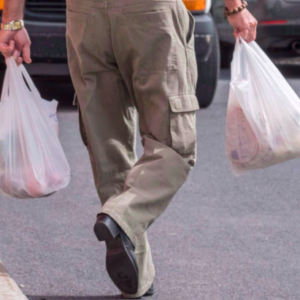Should the Delaware Valley Follow New Jersey’s Strict Plastic Bag Ban?

New Jersey has banned food service businesses, grocery stores, and retail stores from providing single-use plastic bags in a cause celebre for anti-plastic activists. But one critic says that move flies in the face of scientific fact.
Many Delaware Valley residents are preparing for their municipalities to jump on the bag ban bandwagon. And several towns are already on board.
At least eight other states have a similar plastic bag ban, and Philadelphia and other big cities such as Boston and Los Angeles have also instituted them.
Zach Taylor, director of the American Recyclable Plastic Bag Alliance, notes the downside of bag bans.
“Regardless of the policy specifics, bans force retailers and consumers to switch to products that are often made from plastic, are nonrecyclable, and have greater environmental impacts than the products they replace,” Taylor said. “It’s hard to see how policies that require bags with worse environmental profiles advance the sustainability goals that supposedly underpin these regulations.”
And for thousands of Pennsylvania workers, plastic represents something else entirely: Good-paying jobs. Approximately 37,221 plastics-related jobs are in Pennsylvania. Some 6,931 of them are in Berks, Bucks, Chester, Delaware, Montgomery, and Philadelphia Counties.
In April, an eight-to-one vote by the Haverford Township Board of Commissioners made it the first in Delaware County to ban single-use plastic bags. Beginning in January, businesses will no longer be allowed to provide customers with beverage stirrers or plastic take-out bags, and plastic straws will only be available upon request.
Commissioner Conor Quinn was the only commissioner who voted against the ban. His objection was the inclusion of plastic straws. In Quinn’s work with people living with ALS, he told WHYY that many of those people would need straws in public facilities and he does not believe they should have to go out of their way to ask for them.
Climate change and concerns about litter are the primary motives for the bans. According to the regulation, single-use plastic bags, beverage stirrers, and straws degrade more slowly than recyclable alternatives. Enacting significant restrictions on them is intended to improve the health of the environment and its people.
Joy Baxter, a resident of Havertown, told PhillyVoice she previously wrote to the Board of Commissioners about pursuing a plastic bag ban to decrease litter in Havertown’s waterways.
“We are already dealing with the impacts of single-use plastic litter,” Baxter said. “We should be the ones enacting legislation to deal with it.”
Other Delaware Valley municipalities, including Radnor and Tredyffrin Townships, are considering their single-use plastic regulations. And Narberth was the first to enact a ban but took the state to court to be allowed to enforce it. Eventually, that case, which Lower Merion and Philadelphia joined, died after the legislature removed the section barring municipalities from enacting plastic bag bans from a fiscal bill.
After the July 2019 Borough Council approval, West Chester has implemented its plastic bag ban as of Jan. 1. While paper bags are permitted as an alternative, they must consist of recycled content and also be recyclable.
Businesses must charge and disclose a 10-cent fee on each bag provided to customers. That regulation does not apply to product packaging or bags without handles used to wrap raw food products such as fish and meat, which could otherwise represent a health hazard.
The New Jersey law is more strict. It requires restaurants and food trucks to stop serving takeout food in Styrofoam-like products. Grocery stores and retailers must also stop selling polystyrene foam products like plates and cups. In fact, New Jersey is the first state to take the extreme step of outlawing paper bags in stores larger than 2,500 square feet.
Those policies are based on politics and posturing, critics say, not science.
“Single-use plastic bags are the worst environmental choice at the supermarket? Wrong: they’re the best choice,” wrote environmental journalist John Tierney in the City Journal. He reports that because single-use bags are so thin and light it takes little energy to ship them — unlike paper or reusable manufactured bags. It also takes far more carbon to make the other bags, which means “the net effect of banning plastic grocery bags is more global warming. Exactly how much more depends on which researchers’ life-cycle analysis you choose, but there’s definitely more carbon dioxide in the atmosphere.”
At least one resident thinks the ordinance creates a big hassle but with little net effect.
“I don’t mind doing my share to make West Chester a better place for all of us,” said Anita Edgarian. “I like the idea of getting away from plastic bags. However, there has to be a multi-prong approach. How about all the plastic water bottles that are being sold? What do we do about drinks and take-out boxes? Do we have a plan for that?
“It seems useless if we don’t have a manageable plan for the rest of plastic or Styrofoam waste and we only ban plastic bags,” she said. “Most importantly it is hypocritical when leaders fly their private jets to meet and make decisions about the environment for the average person who buys a dozen eggs and can’t have a bag to carry them out.
“Ask anyone who has unwrapped a toy,” she said. “Wouldn’t it be better for the environment if the toy manufacturers didn’t waste so much plastic and cardboard to package toys?”


